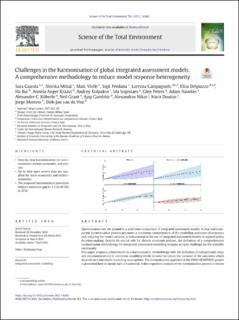Challenges in the harmonisation of global integrated assessment models: A comprehensive methodology to reduce model response heterogeneity
Giarola, Sara; Mittal, Shivika; Vielle, Marc; Perdana, Sigit; Campagnolo, Lorenza; Delpiazzo, Elisa; Bui, Ha; Kraavi, Annela Anger; Kolpakov, Andrey; Sognnæs, Ida Andrea Braathen; Peters, Glen Philip; Hawkes, Adam; Köberle, Alexandre C.; Grant, Neil; Gambhir, Ajay; Nikas, Alexandros; Doukas, Haris; Moreno, Jorge; van de Ven, Dirk-Jan
Journal article, Peer reviewed
Published version

Åpne
Permanent lenke
https://hdl.handle.net/11250/2788636Utgivelsesdato
2021Metadata
Vis full innførselSamlinger
- Journal articles [478]
Sammendrag
Harmonisation sets the ground to a solid inter-comparison of integrated assessment models. A clear and transparent harmonisation process promotes a consistent interpretation of the modelling outcomes divergences and, reducing the model variance, is instrumental to the use of integrated assessment models to support policy decision-making. Despite its crucial role for climate economic policies, the definition of a comprehensive harmonisation methodology for integrated assessment modelling remains an open challenge for the scientific community. This paper proposes a framework for a harmonisation methodology with the definition of indispensable steps and recommendations to overcome stumbling blocks in order to reduce the variance of the outcomes which depends on controllable modelling assumptions. The harmonisation approach of the PARIS REINFORCE project is presented here to layout such a framework. A decomposition analysis of the harmonisation process is shown through 6 integrated assessment models (GCAM, ICES-XPS, MUSE, E3ME, GEMINI-E3, and TIAM). Results prove the potentials of the proposed framework to reduce the model variance and presen
